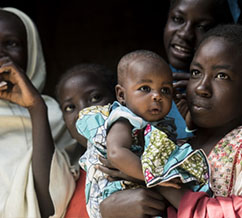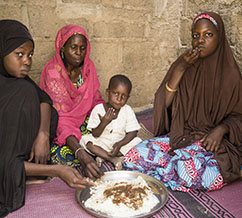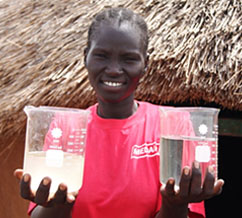On September 21, USAID Administrator Mark Green announced approximately $575 million in new humanitarian funding to support emergency response activities in Nigeria, Somalia, South Sudan, and Yemen—the four conflict-affected countries facing severe food insecurity and malnutrition crises—as well as neighboring countries hosting refugees fleeing those crises.
Post-gu seasonal assessments indicate that while Famine—IPC 5—levels of acute food insecurity have been averted in Somalia, the risk of Famine persists through December for internally displaced persons (IDPs) and other vulnerable populations in the worst-affected areas of Somalia.4 In addition, an estimated 3.1 million people are expected to face Crisis—IPC 3—or Emergency—IPC 4—levels of acute food insecurity through December, with an estimated 6.2 million people likely to require humanitarian assistance, according to the USAID-funded Famine Early Warning Systems Network (FEWS NET) and Food Security and Nutrition Analysis Unit–Somalia (FSNAU).
The United States is deeply concerned about the risk of famine in northeastern Nigeria, Somalia, South Sudan and Yemen. We are the single largest donor of humanitarian assistance for these countries, providing lifesaving aid to avert famine and help people in need. U.S. assistance includes emergency food, nutrition, water, shelter, healthcare, sanitation, hygiene services and protection. The United States also provides humanitarian assistance to refugees from these four countries. On September 21, on the margins of the 72nd United National General Assembly, USAID Administrator Mark Green announced more than $575 million in additional U.S. humanitarian assistance for the four countries at risk of famine.
During the September 18–22 UN General Assembly in New York, USAID Administrator Green announced nearly $54 million in additional FY 2017 funding for the humanitarian response in Nigeria, including nearly $28.9 million in USAID/OFDA funding, more than $22.7 million in USAID/FFP funding, and $2.4 million in State/PRM funding.
Health actors, including U.S Government (USG) partners, continue to scale up health and water, sanitation, and hygiene (WASH) activities in response to the cholera outbreak in northeastern Nigeria’s Borno State. Between mid-August and September 13, health authorities recorded more than 1,900 suspected and confirmed cases, including 44 associated deaths, in Borno’s capital city of Maiduguri and Dikwa and Monguno local government areas (LGAs), according to the Borno State Ministry of Health (SMoH).











Comment
Make a general inquiry or suggest an improvement.